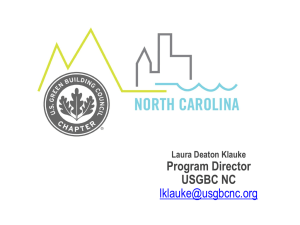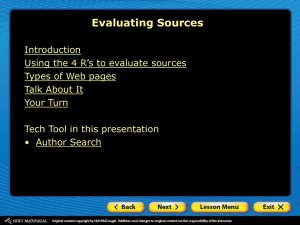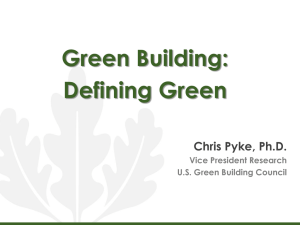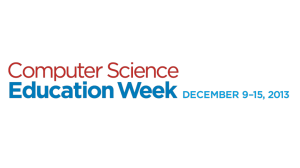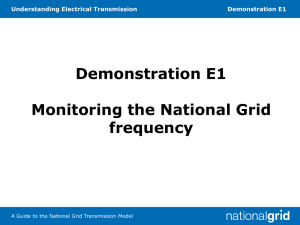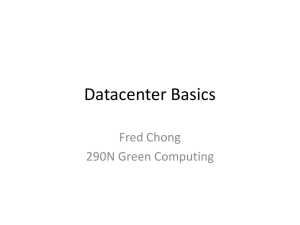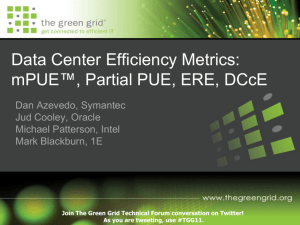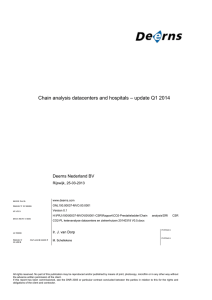Green Data Centers
advertisement
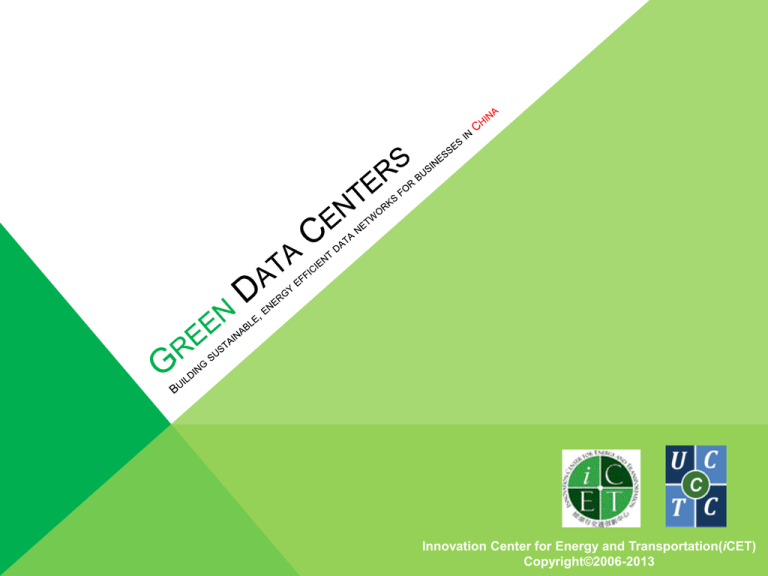
Innovation Center for Energy and Transportation(iCET) Copyright©2006-2013 THE MODERN DATA CENTER TRADITIONAL COMPUTER DATA CENTERS are contained facilities which house the many large computer systems and associated components in isolated, temperature controlled rooms. Typically, a data center houses: • Telecommunications systems • Storage systems • HVAC (heating, ventilation, air-conditioning) systems • Security systems • Redundant and backup systems (i.e., redundant storage systems, emergency backup power generation) Sources: wikipedia.org; datacenterknowledge.com THE MODERN DATA CENTER DESIGN CONSIDERATIONS for data centers may ask for a single room of a building, one or more floors, or an entire building. A few key design aspects: • Site selection: proximity to available power grids, telecommunications infrastructure, networking services, transportation lines and other environmental factors to be taken into consideration for data center design. • Electrical power: backup power consists of one or more uninterruptible power supplies, battery banks, and/or diesel generators. • Modularity and Flexibility: essential in allowing for a data center to grow and change over time; how readily upgradeable or interchangeable a data center’s components are. Sources: wikipedia.org; datacenterknowledge.com “MODULAR” DATA CENTERS A RECENT TREND in the industry is the building of “modular” data centers. These comprise of two types of form factors: Often referred to as containerized data centers or portable modular data centers, this type fits data center equipment (servers, storage and networking equipment) into a standard shipping container, which is then transported to a desired location. (PORTABILITY) A center that fits data center equipment into a facility composed of prefabricated components that can be quickly built on a site and added to as capacity is needed. (QUICK BUILD & CUSTOMIZATION) Sources: wikipedia.org GROWTH OF INTERNET USAGE THE DIGITAL UNIVERSE will grow 44 times larger over the course of the decade, due in part to the increasing use of social media, mobile usage and cloud computing1. This in turn translates to a greater demand for data centers. AS A COUNTRY, China has seen amazing growth in internet usage over the recent years: •China has had 538 million Internet users and the Internet penetration rate has reached 39.9% by the end of June 2012. The first half of 2012 witnessed an increase of 24.5 million Internet users, with the Internet penetration rate up 1.6%2. •By the end of June 2012, the number of mobile Internet users in China has reached 388 million, an increase of 32.7 million over the end of 20112. •By the end of June 2012, China has had 146 million rural Internet users, increasing by 14.64 million over the end of 20112. Sources: (1) International Data Corporation; (2) CNNIC ENERGY & ENVIRONMENTAL COSTS A KEY ISSUE for modern data centers is the amount of power drawn to run these facilities. •By 2012, the cost of power for the data center is expected to exceed the cost of the original capital investment1. •For higher power-density facilities, electricity costs account for over 10% of the total cost of ownership (TCO) of a data center2. In addition, data centers use diesel generators for backup power and major energy sources that heavily rely on coal production to produce electricity, contributing to the environmental hazard of running large, power hungry facilities. •Information and communications technologies contribute 2% of global carbon emissions, with data centers accounting for 14% of that footprint3. •At this trend, Greenhouse Gas (GHG) emissions from data centers are projected to more than double from 2007 levels by 20203. Sources: (1) US Department of Energy 2010; (2) J Koomey et al, Intel 2009; (3) The Climate Group, 2008 DEVELOPING EFFICIENCY STANDARDS POWER USAGE EFFECTIVENESS (PUE) is a measure, developed by The Green Grid, of how efficiently computer data center uses its power; specifically, how much of the power is actually used by the computing equipment (in contrast to cooling and other OVERHEAD). Average data centers have a PUE between 1.8 – 2.5. LEADERSHIP IN ENERGY AND ENVIRONMENTAL DESIGN (LEED) standard developed by the US Green Building Council consists of a suite of rating systems for the design, construction and operation of high performance green buildings. Categories considered include Sustainable Sites, Water Efficiency, Energy and Atmosphere, Materials and Resources, and Indoor Environmental Quality. Levels of certifications rank from Certified, Silver, Gold, and Platinum. Sources: wikipedia.org; thegreengrid.org; usgbc.org; datacenterknowledge.com GREEN DATA CENTERS IN THE US APPLE’S LEED-PLATINUM data center in Maiden, North Carolina, built by Holder Construction, utilizes two 100-acre solar power farms that generates 20MW of power each, as well as a Bloom Energy developed biogas-powered power generator (using biogas from nearby landfills) to add an additional 4.8MW. Apple estimates that, upon completion, 60% of the center’s power will be supplied by those on-site renewable-energy power sources. Apple aims to make it a zeroemission site. Other planned energy efficient measures include: • Chilled water storage system to improve chiller efficiency (for HVAC systems) • Precision cool air distribution system Sources: wired.com; datacenterknowledge.com GREEN DATA CENTERS IN THE US Facebook’s LEED-Gold Prineville Data Center in Prineville, Oregon built by DPR Construction has a capacity of 28MW and a PUE rating of 1.06 – 1.08. It uses an innovative cooling system created for the unique climate characteristics of central Oregon. In addition, it also utilizes an evaporative cooling system and an airside economizer that brings in 100% ambient air1. On average, the facility consumes 28 gallons per minute, while other local industrial users consume 60 -173 gallons per minute2. Not only does the facility use energy from local power supplier Pacific Power, it also has built solar arrays to power office use3. Sources: (1) dpr.com; datacenterknowledge.org (2), (3) THE KEY TO GREEN DATA CENTERS GREEN DATA CENTERS address two issues which plague the average data center: 1.The power required to run the actual equipment (CPU’s, memory, hard drives, etc). 2.The power required to cool the equipment (HVAC). REDUCING THE POWER required will effectively lessen not only the energy consumption but also the impact on environment. Green solutions include: • More efficient hardware components and software systems (e.g., systems virtualization) • Innovative cooling systems • Using natural ways to cool equipment (evaporation, natural chillers) • Building near advantageous natural resources or environments (rivers, cold climates). • Effective server and rack management for better air-flow US-CHINA GREEN DATA CENTER ALLIANCE PROPOSAL US-CHINA CLEAN TECH CENTER (UCCTC) is a cooperative program between the U.S. Department of Commerce and the Innovation Center for Energy and Transportation (iCET). Please visit www.uschinacleantech.org and www.icet-usa.org to learn more about the program. UCCTC proposes the formation of a US-China Green Data Center Alliance (UCGDCA) to build sustainable, energy efficient data center solutions for Chinese companies. Current US technology already available is an ideal source for Chinese businesses seeking green technology. With previous experience working with local, state and national governments to forge alliances and best practices, UCCTC is committed to bridging US and Chinese companies across the international divide. US-BASED DATA CENTER BUILDERS Holder Construction – US based construction company has built LEED certified data centers for major companies including Fannie Mae and Apple. Partner with The Green Grid. Turner Construction – California based construction company. Built LEED certified data centers across California and USA for Columbia University, Fujitsu, Motorola. DPR – large national commercial contractor based in Redwood City, CA. Built Facebook Prineville Data Center as well as centers for AMD, E*TRADE, and others across the US. All LEED certified. Partner of The Green Grid. Hornbaker Group – formerly Power Loft Services, a Alexandria, VA based company. Specializes in development of high-density, high-security data centers. Built COPT DC6 (formerly Power Loft @ Innovation), a LEED-Gold data center with a PUE of 1.281. Sources: (1) SCMP; (2) Wired US-BASED DATA CENTER BUILDERS Digital Realty –a San Francisco, CA based multinational data center company which builds and maintains data centers around the world. Member of the Green Grid initiative. Builds data centers to LEED certification standards (BREEAM in Europe). Offers a variety of data center solutions to fit any consumer need. Began construction of a center in Hong Kong in 2012, the first China-based operation for the company2. The company has also expressed great interest to partner with mainland developers and service providers for potential centers in Beijing and Shanghai2. Vantage Data Centers – California based Data Center Solutions company. Has built LEEDPlatinum data centers to cater to large cloud-based IT companies including a $3-million lease to Mozilla3. Heavily focused on building green data centers. Currently does not have a presence in China. RagingWire Data Centers – Sacramento, CA based data center solutions company. Has built and maintained LEED-Gold certified centers for NVIDIA, DreamHost, Photronics. Focused on producing green, efficient data centers. Currently does not have operations outside of the US. Data Specialties Inc. – a Buena Park, CA based data center solutions company. Offers design, construction, electrical systems, communications, security, and mechanical solutions for data centers. Has built data centers across the US. Sources: (1) Hornbaker Group; (2) SCMP; (3) Wired US-BASED DATA CENTER BUILDERS Lee Technologies – a US based data center solutions company, subsidiary of Schneider Electric (Green Grid board member). Has built the LEED-silver Harris Cyber Integration Center (since been sold by Harris Corp.) with a PUE under 1.361. Has built and managed data centers for private and public sector clients in the US2. Does not have a presence in China. Base Partners Inc. – a San Francisco, CA based data center company. Has built and maintained data centers across the US, Europe, Japan and Hong Kong. Capable of building data centers to specify “green” design concepts. IO Data Centers – a Phoenix, AZ based data center company. Builds raised-floor modular data centers and provides efficient systems and colocation solutions. IO’s modular designs have attracted large clients worldwide, such as Goldman Sachs, seeking sustainable, spacesaving, and low-energy answers. Quality Technology Services (QTS) – a Kansas based data center provider. Offers custom data center services, colocation services and cloud services. Achieved LEED-Gold at their Atlanta Matro data center and has recently begun green initiatives at all centers (e.g. solar panels)3. Currently, no presence in China. Sources: (1) Harris Corp; (2) Lee Tecnologies; (3) The Whir US-BASED HARDWARE, SOFTWARE & COMPONENTS SUPPLIERS ZT Systems – a Seacaucus, NJ based data center solutions company. Produces energy efficient hardware and provides custom servers solutions for clients. Member of the Green Grid. 42U – a Broomfield, CO based data center solutions company. Provides data center cooling, power, monitoring and management solutions. Also offers hardware (e.g. server racks). Member of the Green Grid. Belden Inc. - a St. Lous, MO based cable manufacturer. Produces energy efficient, highbandwidth cables, as well as racks, enclosures and other hardware for data centers. Also provides cabling and security systems. Products have been used in LEED certified buildings across the US. Active Power – an Austin, TX based power solutions company. Designs and manufactures sustainable, energy efficient critical backup and continuous power solutions for data centers (in the form of modular “power containers”). Member of the Green Grid. Turbine Air Systems (TAS) Energy – a Houston, TX based energy and environment control company. Specializing in commercial cooling systems, builds modular cooling systems1 and custom energy efficient modular data centers, in partnership with other contractors. Does not have a presence in China. Sources: (1) Datacenter Dynamics WHY GREEN? WHY BUILD a Green Data Center based on Clean Tech? •ENERGY EFFICIENCY = LOWER ENERGY COSTS •GREATER RETURN ON INVESTMENT (ROI) = MORE INVESTMENT CAPITAL •LESS USE OF RESOURCES = LOWER ENVIRONMENTAL IMPACT On Choosing US Clean Tech •Proven quality & efficiency of Clean Tech •Higher Industry Standards •Leader of Innovation in Clean Tech THANKS! US-CHINA CLEAN TECH CENTER (UCCTC) mission: To provide US clean tech firms a costeffective and strategic launching pad where they can showcase their products & services in China’s leading clean tech markets in order to increase market demand for US clean tech. Please visit www.uschinacleantech.org Contact info@uschinacleantech.org


